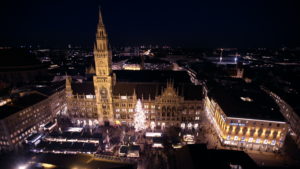Munich Nights Chapter 28: “The Old Man And His Village, And The Arrival of Brother Jerome”

Darling Walter,
Today I am going on an exciting picnic with Carin, well who else, to see and explore the surrounding but rather interesting countryside and we’re really both looking forward to it. Otto will be our usual driver … oh but before I forget, I must tell you that there is only one telephone in the hospital building can you believe and that it is safely secured in the director’s private office. So obviously there is no privacy if and when you receive a personal telephone call. Carin thinks the man keeps it locked at night under his desk inside a large varnished box that she noticed in his office some days ago. He also keeps assorted pot-sized cacti on his office window sill. Horrible spiky things. Just give me roses or lilies any day. And Otto has bought for our disposal for the day’s outing a gleaming hospital Daimler sovereign. He has also packed away in the car boot some most welcomed hampers of food and drinks from the kitchen.
Last night Carin and I visited the rarely used locked music room. And you should have seen her face light up when she noticed an old harmonium placed on the stage. But it was painful for me to see her sit uncomfortably in front of the keys and try to coax a melody from its frame. Her fingers just could not coordinate to play some favoured Bach that she wanted to try.
On the wall, I noticed that someone had hung a tinted framed photograph of Madam Butterfly for some reason. She looked very sad and I’m not surprised because of what happened to that poor woman. That Lieutenant Pinkerton has a lot to answer for!
As we proceeded to leave the building the next morning, the director decided to see us off personally. And presented both of us with a full party salute from the top of the steps. We both casually just held up the palm of our hands in return. He is rather a strange man I must say but thinks the world of Hermann and is always talking about Hermann’s wartime flying exploits. Carin finds it all rather embarrassing I must say.
On the way there Otto suddenly announced as he was driving that he hoped one day all German cars would be easily fitted, and wait for it, with all things, a …. wireless! Carin naturally thought the idea totally preposterous saying she would rather have some welcomed heating fitted into the car as a luxury if possible.
And besides, she said firmly, “it would be far too dangerous to listen to or sing along to music for any driver and would dangerously distract him or her from concentrating on the road ahead.”
I think she was correct as usual don’t you?
I also noticed that Gertrude was silently nodding in agreeing with Otto’s suggestion. And I know at home, only too well, that she loves doing her daily chores whilst listening to the wireless. She has also been busy helping and serving the daily meals in the dining room, and she told us both rather confidentially this morning just after breakfast, that some of the sectioned patients here are as young as eight years old. With many who are being sadly tied to their beds each day and many being sedated just to keep them quiet. It’s terrible to hear if it’s true?
Well, we later paused for a well-needed snack. Otto carefully set up a luncheon card table with a crisp tablecloth and some delicious sandwiches and homemade cakes and biscuits to offer us. Gertrude gleefully told me that she had baked those biscuits herself. They were so delicious but always very fattening, unfortunately! But we both certainly enjoyed the chopped pineapple slices and chipolatas on little sticks as well. Very tasty I must say.
But what I wanted to share with you Walter was the discovery later, of I suppose, an abandoned village.
But first, we watched an amazing aerial display of the birds of the region fly and perform in perfect precision above us.
This caused Carin to pause and say rather sadly in her own inimitable way: “Ah, the little birds of the air they are indeed the true keepers of the skies it is their natural birthright. They are the true beneficiaries of all freedoms.”
This caused us to both exchange a few more details about birds. I was surprised that Swifts are apparently able to fly thousands of miles as well as being able to sleep somehow in the air and feed and drink and maybe remain motionless. Absolutely amazing. I do remember seeing Carin myself years ago in Sweden when I suppose we first met, then delicately feeding and talking almost in a whisper to so many wild birds perched on her hands and arms. It was amazing to watch how they flocked to her in complete safety.
Incidentally, the hospital boasts for some reason, a small zoo probably for therapy reasons with a friendly goat named Gottfried who will also take whatever scraps Carin brings for him to eat. But somehow he doesn’t seem to care for me being there very much. And just rudely turns his back on me when I approach him with some titbits.
Well, my love, I must really come to the point of this letter and what happened yesterday on our daily excursion. And it’s so so fascinating. So I hope I don’t forget to omit anything.
As we were driving along the now deserted and rather neglected pitted coastal road we suddenly noticed the remains of an inward collapsed lighthouse with a small adjoining building still intact with perhaps maybe young cob trees growing closely around it.

Carin immediately asked Otto to stop and we both climbed out of the car now rather excited to go and investigate. Both Gertrude and Otto decided to remain seated in the car. He, as usual, smoked his disgusting black Sobranie cigarettes. Gertrude remained isolated with her nose, as usual in one of her romantic popular books.
The building looked to me as if it could have been used for many purposes but certainly never for personal habitation. I suppose it could just about contain a medium-sized motor car. And with that awful single barred window, it just added more to its enigma.
The old dented door was constructed from a thick oak tree and it would take a great deal of exertion to gain any entry.
Then as we tried looking into that window through the bars, Carin was running her hand against the coarse bricks as if seeking a hidden answer to their age when an elderly voice quietly interrupted our inspection: “Good afternoon ladies I do hope you are both well today.” And there he stood as we turned around, a very old man of undetermined age, but offering a welcoming and friendly smile upon his lined face. But listen to this my dear. He was surrounded by half a dozen sheep who stood like statues all around his cracked boots looking at him with devotion … oh and a faithful old sheepdog who looked at us both with concern then at his beloved old master for a response before being rewarded with an affectionate pat on the dog’s head.
“And a good afternoon to you too, sir,” replied Carin kindly. We were both rather intrigued by this house if that is what it is. So could you perhaps kindly enlighten us? He then surprisingly invited both of us to “please follow me” gesturing with his wrinkled tanned hand towards several destroyed cottages still standing. And Carin noticed that some of the brickwork seemed about the same age weathered colour as that lighthouse cottage. Some splintered sheds or outhouses were now seen on the other side of the road as well. But all added to the atmospheric desolation of this place we both agreed.
As far as one could see there were no trees at all. These must have been felled long ago for kindling for this village, said Carin. But there were dense screens of bushes. Some sad saplings had sprouted haphazardly through them. And a dense undergrowth must still be a safe abode for the little foraging animals who lived and survived there.
But Otto, now slightly concerned it seemed, by noticing the old man talking to the ladies, started to climb out of the car to offer any needed protection. But Carin just waved him back and dismissed his concern with a smile and a brief shake of her head.
Originally the village had been planned by someone perhaps in authority in the shape of the letter T we later learned … not sure why.
The old man had placed himself carefully onto a fallen, heavy log. And now he watched them both carefully walk into the nearest dilapidated cottage. Some part of the walls still stood having never surrendered to the ravages of time.
And outside, like so many of his previous generation, he habitually reached for his beloved briar pipe, packed it carefully with a favoured plug tobacco, fired it up and puffed away with a happy contented satisfaction. And then simply watched these two strange ladies enter in a careful single file into the dilapidated cottage, then walked through a solitary door just about hanging on one hinge.
The elderly tall lady called Carin had to carefully stoop to enter. But did not look at all healthy from what he could see of her. Maybe suffering from an advanced cause of consumption. He had seen its serious symptoms as a boy so many years ago in his village. Hadn’t he helplessly and painfully watched his own family and many others succumb to its debilitating symptoms?
Later when he was a young and eager medical apprentice to the late beloved brother Jerome, he had then seen and helped treat many other fatal illnesses with the brother, that usually claimed so many people and often before their allotted time. The scourge of any fatal illness affects all it touches both young and old rich and poor he knew. Being an arbitrator of none it claims as its own.
It was now inside that small, single, crumbling room and with some musical birds now happily nesting in the loft space, that we both listened to their songs with a smile.
It was obvious to us both that this scarce lack of living space was where many families had once lived and probably just about survived in squalor. Pieces of cups and plates could still be seen scattered around the hearth as well as a broken high chair, an empty wooden birdcage and several headless discarded dolls.
For some reason, a small, tidy cemetery with dozens of upright uniformed painted wooden crosses entered my mind. But of who or when those last final rites were performed on the village dead, I really had no idea.
Outside the old man watched them delicately traipse around several other of the exposed buildings and thought they both must view these as old dusty museums exhibits – and himself as well – as interesting relics depicting how his people once lived and died so very long ago.
So, darling, I saw the old man and his dog and those faithful sheep, of course, watching us both with amusement and puzzlement it seemed.
But I did wonder what his purpose was for showing us this village and what would be the consequences? And that maybe he might perhaps share with us later.
“My, look at this” exclaimed Carin now standing erect in the rear of the cottage. There in the once abundant, but now sad orchard and overgrown vegetable garden, some vegetables were still sprouting but now rather haphazardly. And some apples and pears were hanging from branches though most were withered and inedible. Surprisingly there were several large cherry trees as well.
Several noisy rooks now swooped low over us as if to perhaps investigate these strangers now intruding into their domain and warn them sharply away.
We now happily retired to return and talk to the old man. And Carin kindly invited him back to our car to share a late lunch with him. I was sure he had more to inform us about its past and we were eager to hear his story.
Being a rather warm day, he now looked forward to quickly quenching his own thirst. And he was surprised at the variety of labelled fruit juice bottles that were placed before him that he didn’t know existed. In fact after sipping his pineapple juice, for the first time, incidentally, he informed us, as he sat back in his wicker seat and started the story and having his glass discreetly topped up by Gertrude’s willing hand.
He seemed happy to be able to relate his story to us: “Our little village is less than forty souls or serfs” he laughed. “As we would call it today. But we were happy but poor of course … well, most of the time. But then we knew nothing else or any other lifestyle. We simply lived and died under the walls of the great castle as an unknown outpost in the Kaiser’s empire. Sometimes we happily welcomed travelling peddlers. They would arrive always unexpectedly with many items to barter or purchase, such as shoes and sturdy boots and leather jerkins. One such traveller entertained us, young men, one evening with many exciting stories of his travels in faraway countries such as Turkey and Russia and England. And he had even made the acquaintance of the young Queen Victoria in somewhere called Scotland. He had also visited and had happily sojourned in many other far off countries. We young men all yearned to travel and enjoy and sample the sights that he had seen and eagerly informed us all about.
But all this changed forever for me when brother Jerome arrived in our little village. And then my young inexperienced life would never ever be the same again.
To be continued…

(C) Copyright G. Patrick Battell
August 2020